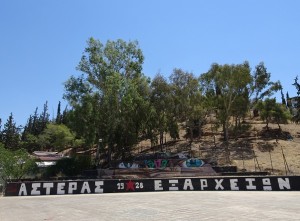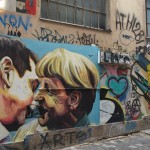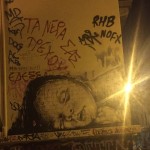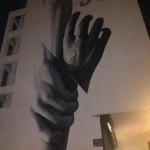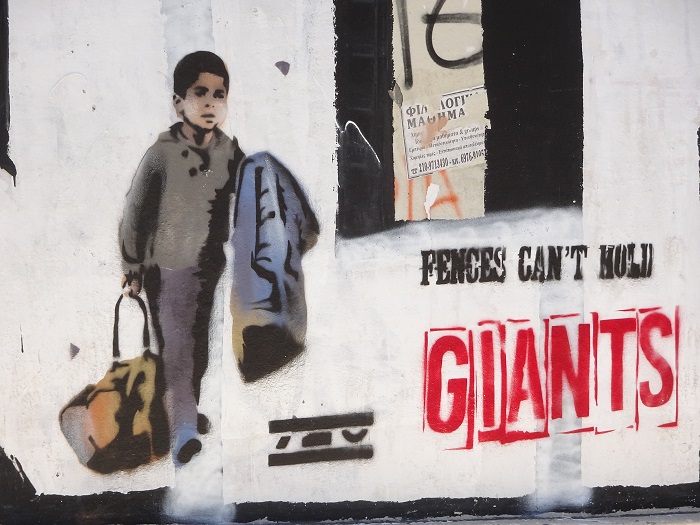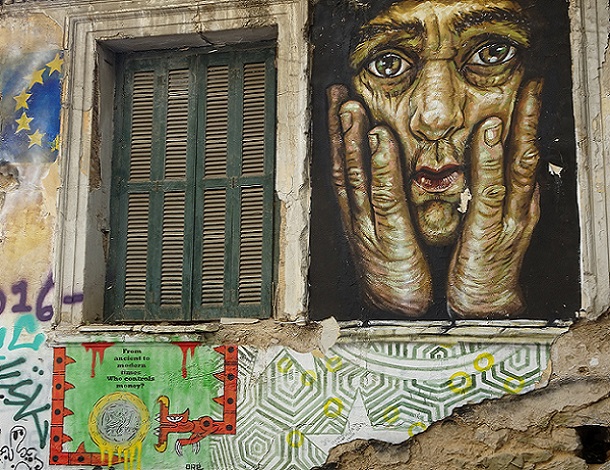
Before all else, I must inform anyone who reads this and hasn’t already seen it through various other social media channels: IRA GLASS SAID MY NAME ON THIS AMERICAN LIFE. Well, sort of. He called me “Matteo” when issuing a brief thank-you in the credits in the show they did on refugees in Greece—producers and reporters from TAL had come to the GFR office a few months ago and conducted interviews and listened in on Skype calls, and I happily helped with a follow-up phone interview and several email exchanges to answer questions and share information. So basically I’m a very important and famous expert, and you should all listen to the podcast and its follow up that just came out this week here!
Anyway, last week, the walls of Athens were talking to me.
Really, hear me out on this- I’m not admitting to listening to the voices in my head (well, sometimes), only the voices of the walls. Because almost everywhere I go in Athens, the walls are shouting at me. “REFUGEES WELCOME!” “NO BORDERS!” “ANTI-NAZI!” Those are just some of the phrases, short and long, that are scrawled across the walls of the city. The art that often accompanies or stands in place of the messages is even more telling: a young, distorted man crawling with the burden of a city on his back, Tsipras and Merkel in a passionate embrace. This is the most graffitied city I have ever seen in my life, and maybe it’s one of the reasons Athens isn’t known for its aesthetics or beauty the same way that Florence or Paris usually are. But to me, the city is beautiful in a way that feels more real than the historic architecture of other European cities. The walls are passionate and political, they speak of institutional disdain and sympathy with the rejects of society. I absolutely love it. I love the grungy, dirty, complicated mess of Athens, and I love listening to the walls when they speak. And yes, the anarchist neighborhood of Exarcheia* might speak the loudest, but it’s not the only one—Athens is literally built of wailing walls and belligerent buildings. They tell vibrant stories of struggle and solidarity, and I think that just taking a walk around Athens, never meeting a Greek in person, would convince you that the city is both complicated and compassionate.
- The embrace
- Peace
- Solidarity
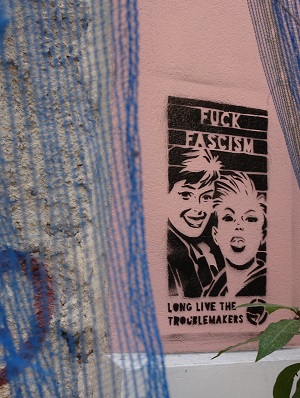 The walls of Athens exemplify the solidarity that I have come to know and depend on for my work. There is a spectrum to be sure—from the true anarchist, political movements that run media-darling squats to house refugees to the well-meaning and sometimes blundering foreign volunteers who swing by the camps while on vacation and help with mattress distribution. What has been most helpful to me, beyond my coworkers and contacts with various NGO representatives in the field, are the Facebook groups I’ve joined, such as “Immigrant and Refugee Support in Athens” or “Information Point for Volunteers.” The groups are mostly well-managed, well-organized, and legitimate forums for information sharing, rumor disputing, highlighting important initiatives and opportunities, and supporting the necessary volunteer efforts throughout the country by both Greeks and internationals. Whether in person or on social media, these networks are essential for the continued engagement of the local and international community in the lives of refugees and asylum seekers.
The walls of Athens exemplify the solidarity that I have come to know and depend on for my work. There is a spectrum to be sure—from the true anarchist, political movements that run media-darling squats to house refugees to the well-meaning and sometimes blundering foreign volunteers who swing by the camps while on vacation and help with mattress distribution. What has been most helpful to me, beyond my coworkers and contacts with various NGO representatives in the field, are the Facebook groups I’ve joined, such as “Immigrant and Refugee Support in Athens” or “Information Point for Volunteers.” The groups are mostly well-managed, well-organized, and legitimate forums for information sharing, rumor disputing, highlighting important initiatives and opportunities, and supporting the necessary volunteer efforts throughout the country by both Greeks and internationals. Whether in person or on social media, these networks are essential for the continued engagement of the local and international community in the lives of refugees and asylum seekers.
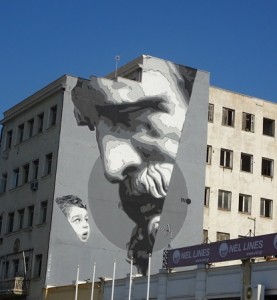 Working on the refugee crisis in Greece can often be incredibly frustrating and depressing—feelings familiar I’m sure to many people in the humanitarian field. It is horrible to receive messages and pictures from people virtually trapped in terrible conditions on island hotspots, pleading for help to reunite with family in Athens, for example, and knowing that you just learned in a UNHCR meeting that there’s basically no one on Leros to help directly (despite an existing asylum office, there are still no authorities actually working in the office to process applications, due to lack of staffing and security concerns). It feels frankly crappy to not be able to provide answers and help that people desperately need—a conundrum that might sound like a broken record for many working in Greece. But what gives me hope? The writing’s on the wall. The people of Athens care, and the ones who care the most do more than just spray paint their solidarity, but they volunteer and they build networks that show the willingness to remain active and engaged for the long-haul. Though I am worried about overall waning hospitality in what is increasingly becoming a protracted situation and sputtering momentum in volunteerism once the summer is over, my experience thus far makes me optimistic that despite what might seem like neglect at the government level or in the media, many people in Greece are fighting hard for refugees’ rights and protection, and that won’t stop any time soon.
Working on the refugee crisis in Greece can often be incredibly frustrating and depressing—feelings familiar I’m sure to many people in the humanitarian field. It is horrible to receive messages and pictures from people virtually trapped in terrible conditions on island hotspots, pleading for help to reunite with family in Athens, for example, and knowing that you just learned in a UNHCR meeting that there’s basically no one on Leros to help directly (despite an existing asylum office, there are still no authorities actually working in the office to process applications, due to lack of staffing and security concerns). It feels frankly crappy to not be able to provide answers and help that people desperately need—a conundrum that might sound like a broken record for many working in Greece. But what gives me hope? The writing’s on the wall. The people of Athens care, and the ones who care the most do more than just spray paint their solidarity, but they volunteer and they build networks that show the willingness to remain active and engaged for the long-haul. Though I am worried about overall waning hospitality in what is increasingly becoming a protracted situation and sputtering momentum in volunteerism once the summer is over, my experience thus far makes me optimistic that despite what might seem like neglect at the government level or in the media, many people in Greece are fighting hard for refugees’ rights and protection, and that won’t stop any time soon.
*The GFR office is in Exarcheia- it was one of the only safe spaces it could move to after a violent, racist attack against the president Yonous and other GFR community members a few years ago.
Posted By Mattea Cumoletti
Posted Aug 10th, 2016


